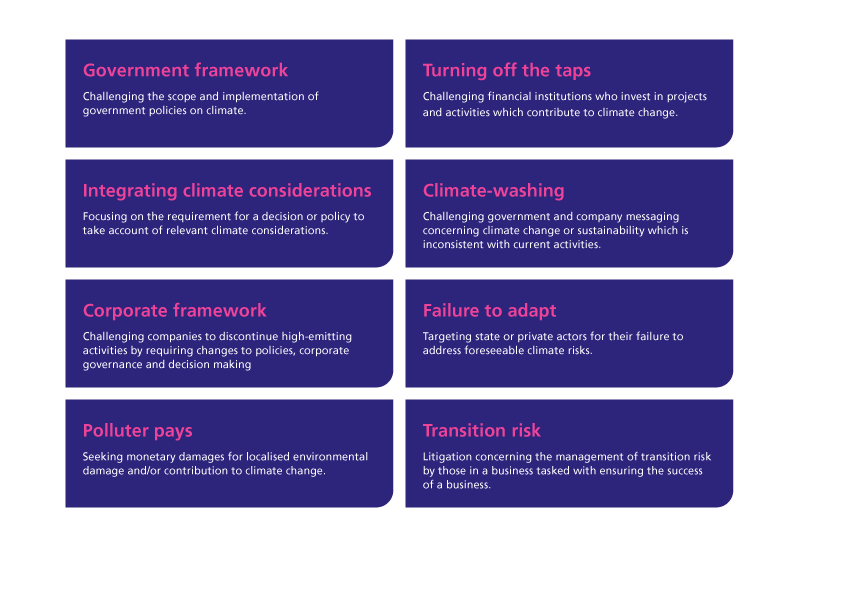Climate Change Litigation: A Snapshot of 2025’s Evolving Landscape

This website will offer limited functionality in this browser. We only support the recent versions of major browsers like Chrome, Firefox, Safari, and Edge.

/Passle/5d9604688cb6230bac62c2d0/SearchServiceImages/2025-07-09-11-42-10-774-686e5592d11acb40859a2d87.jpg)


The London School of Economics (LSE)’s Grantham Research Institute on Climate Change and the Environment has just published its annual report analysing global trends in climate change litigation; defined as “cases brought before judicial and quasi-judicial bodies that involve material issues of climate change science, policy or law”.
The report provides a timely and comprehensive overview of how climate change litigation is evolving around the world. Some of the key conclusions from the report are summarised below.
A Maturing Field
Climate change litigation continues to evolve and achieve a global reach. The report highlights that almost 3,000 cases have been filed globally between 1986 and 2024 – the majority of these being in the United States. While the pace of new filings appears to have stabilised outside the US, the diversity of legal arguments and actors continues to develop.
Growth in the Global South
The report notes the rapid rise of climate change litigation in jurisdictions across the Global South. Countries such as Brazil, South Africa and India are seeing a surge in cases, many concerning constitutional and environmental rights. Notably, in 2024, 56% of cases in the Global South were initiated by government bodies, compared to just 5% in the Global North. China’s judiciary has also become increasingly active, handling over 500 climate-related cases, although many of these cases are not yet captured in litigation databases.
International Legal Developments
International legal developments are clarifying the obligations of the state as they relate to climate change. In particular, the report identifies the following key developments:
Political Shifts
Political dynamics are reshaping the litigation landscape. The report comments on the well-publicised wave of litigation which has followed the arrival of the Trump administration at the start of the year. In Europe, proposed revisions to sustainability regulations (such as the weakening of Article 22 of the Corporate Sustainability Due Diligence Directive) are also creating an element of uncertainty.
The Role of Apex Courts
The report highlights the important role that supreme and constitutional “apex” courts around the world are playing. Between 2015 and 2024, 276 climate-related cases reached apex courts globally. The majority (80%) of these claims have involved government defendants.
The report highlights a trend of, “growing judicial engagement with complex legal questions around responsibility and enforcement”, with rights-based claims seeing notable victories in Latin America and South Asia, whilst courts in Europe and North America generally taking a more cautious approach.
Corporate Accountability on the Rise
The report notes that corporate actors are facing heightened scrutiny. Around 20% of cases filed in 2024 targeted companies or their leadership, with particular focus on those operating in animal agriculture (and associated food and retail industries), which the report estimates accounts for 11-20% of global greenhouse gas emissions. Another area of focus is professional services, with firms in the sector coming under scrutiny because of their ties to emissions-intensive companies and industries. Alongside these claims, increasing efforts are being made to seek to quantify climate-related harm by corporates.
Non-Aligned Litigation
According to the report, in 2024, 27% of newly filed cases can be classified as “non-climate-aligned”, defined as those, “requesting judicial relief that would prevent or delay climate action”. These include legal challenges to climate-related financial disclosure rules and legal actions targeting climate-related financial disclosures and voluntary climate pledges.
In parallel, a number of “just transition” and “green v. green” cases are testing how climate mitigation and adaptation projects can be balanced with fairness, procedural integrity and biodiversity protections.
Beyond the steps of Court…
The report observes that climate change litigation continues to shape climate governance, policy-making and finance, with key cases influencing legal and policy frameworks on the national level. New “climate superfund” laws in New York and Vermont aim (in the face of considerable political resistance) to hold fossil fuel companies financially accountable for climate-related harm. Similar proposals in California, the Philippines, and Australia are also emerging.
Climate change litigation is also now no longer simply a reputational issue – rather, it is increasingly understood as a material financial risk. Companies and financial institutions are beginning to factor it into their ESG strategies, with high-profile cases already influencing decision making.
A Broad Church
The report highlights the diverse array of different types of litigation which are emerging, which are summarized in a table below:

Conclusion
The report is a timely reminder on the diversity of cases across the world, with a range of actors and strategies being deployed. These cases aim to exert behavioural change on market actors, alter established policy or influence public discourse on climate-related issues. The emergence of such claims sits alongside competing claims, which seek to row back existing regulatory frameworks on climate and ESG commitments. The report highlights that the coming years will be crucial, as climate risks intensify and the political environment remains complex.
This article is by Christopher Wenn and Nick Lee
(A copy of the report is available here - https://www.lse.ac.uk/granthaminstitute/publication/global-trends-in-climate-change-litigation-2025-snapshot/)
Want more Burges Salmon content? Add us as a preferred source on Google to your favourites list for content and news you can trust.
Update your preferred sourcesBe sure to follow us on LinkedIn and stay up to date with all the latest from Burges Salmon.
Follow us